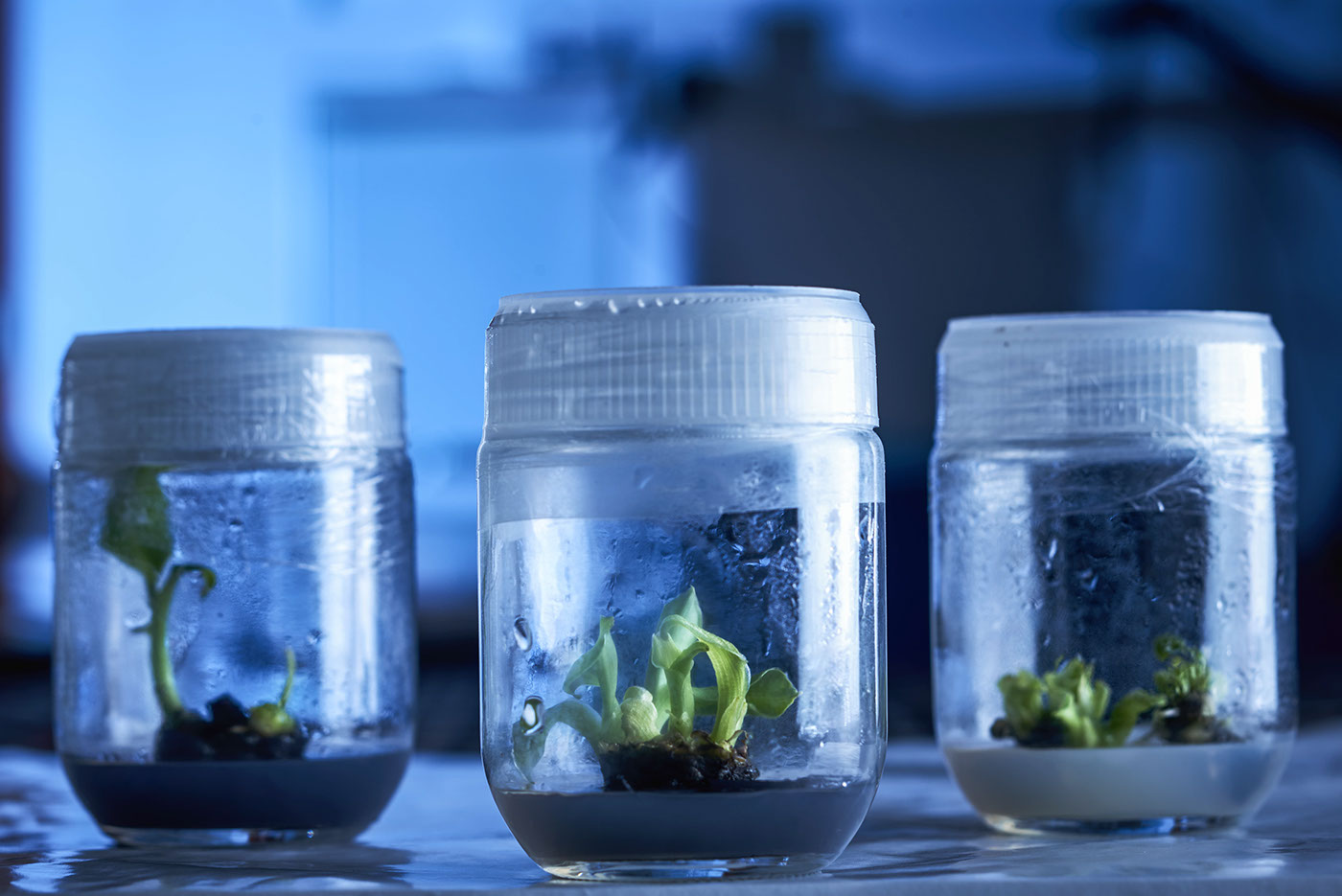
Growing for the Future -
After 20 years of growing hundreds of thousands of fruit saplings and fostering a successful agri enterprise, Mr. Aruna believes it's time for a change. "My children grew up with me growing plants and they have a keen wanting to continue down my footsteps. But they are young, and young people nowadays want to take things a step further. I've built my business by grafting plants in the traditional way, but by introducing tissue culturing today, I am confident my children will use this modern knowledge in a way that can benefit much more people in the future." Anura Plant Nursery is installing a tissue culture lab with the help of Australian Aid to help produce robust, disease resistant plants that will help farmers and households yield more fruitful harvests in the future.
© Reza Akram / DFAT 2017
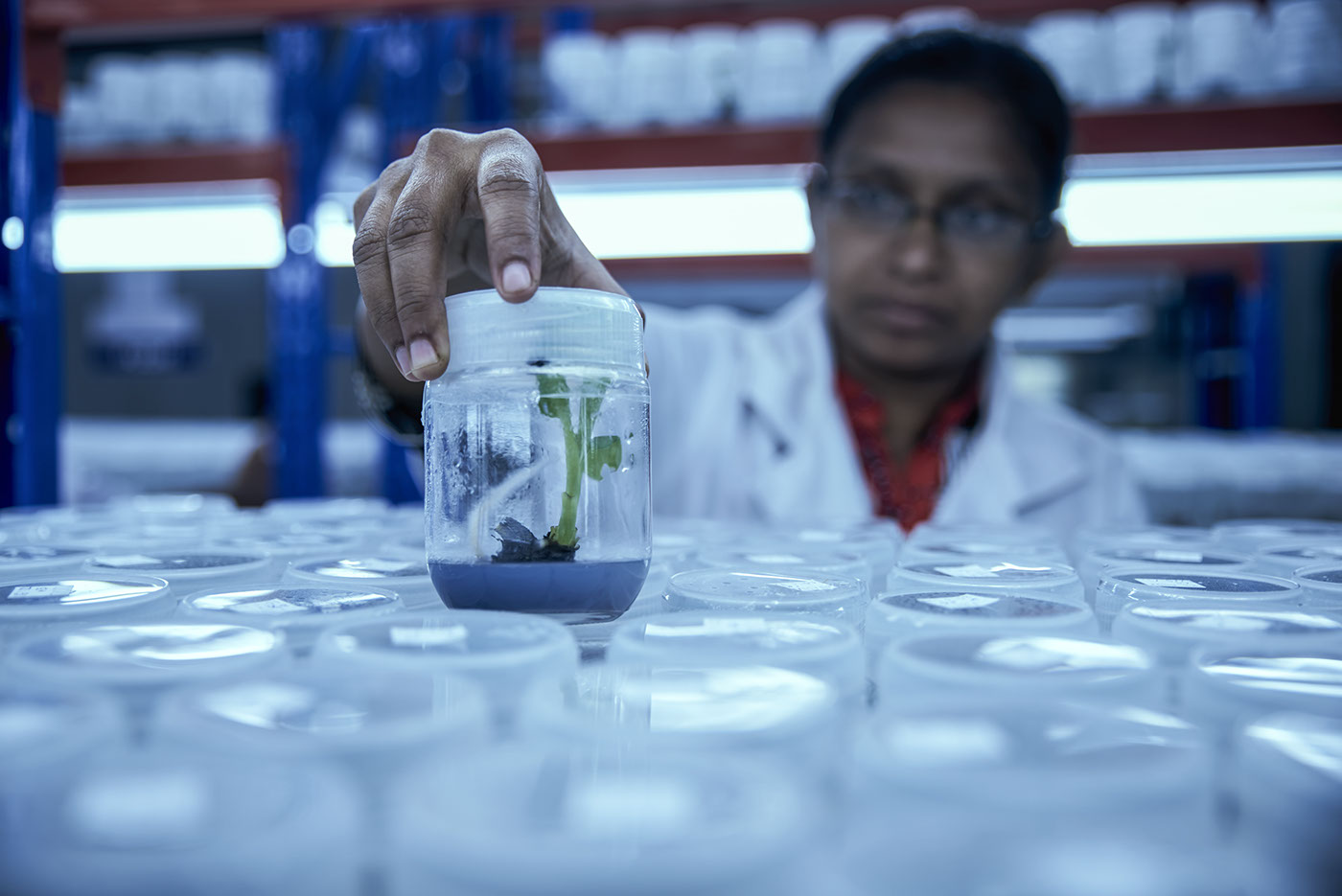
A New Type of Culture -
Tissue culture helps create robust, disease resistant plants through cloning in a sterile compositing lab. In the near future, Aruna Plant Nursery’s expanded tissue culture lab will produce thousands of clones of plants such as bananas, oranges, avocados, and jak-fruit using this technology to provide cultivators with high quality, hardy saplings to grow and yield. The current laboratory equipment has been provided through the Market Development Facility (MDF), a program of Australia’s Department of Foreign Affairs and Trade (DFAT) that aims to stimulate private sector growth in developing countries. Aruna Plant Nursery is presently constructing a second wing for the lab with the support of the MDF. © Reza Akram / DFAT 2017

A Woman's Touch -
80% of the workforce in Anura Plant Nursery are females. The business has turned into a success story over the years, and has spread beyond its original operation in Ranna to 12 cities, distributing more than 15,000 saplings every month. Anura believes the women workers add a special touch that creates a formidable driving force for the whole operation. He unhesitatingly acknowledges this. "Nurturing is natural to women. They care for living things and they are sensitive beings who can help things grow. Where would any of us be if not for the touch of a woman?" © Reza Akram / DFAT 2017

Perfume Nursery -
One of Aruna Plant Nursery’s ongoing projects is to introduce the cultivation of the “walla patta” (gyrinops walla) plant in home gardens and large scale operations. An endangered and protected species, the walla patta plant and its chestnut brown heartwood secretes resin that produces agarwood, a highly lucrative ingredient used to produce perfumes and incense. “We are happy that we can introduce change and growth to people. Over the years, these plants can help people gain wholesome profits and also curb the illegal trade of walla patta in Sri Lanka”, says Mr. Aruna, as he prepares the next consignment of 10,000 walla patta saplings to be released at the end of the month. Several cases of illegal smuggling of the plant from protected forests have been exposed over the last few years, and measures such as this can be instrumental in stopping the threat of smuggling in the years to come. © Reza Akram / DFAT 2017

The Responsibility of Nurturing -
Midwives such as Mrs. Wijesinghe are key figures in small rural communities such as this village in Medawachchiya. They carry out their duties by promoting and monitoring maternal health and nutrition in small communities, spreading the knowledge of wholesome child care with her routine checks every month. It's through people like her that Australian Aid initiatives in promoting child nutrition is disseminated among small communities. "I've been doing rounds in this area for the last 29 years and I've been there from the day a lot of these mothers were born, so everyone sees me as a part of their family."
© Reza Akram / DFAT 2017

Green Moustache -
A child breathes for a moment before returning to his cup of “kola kenda”, a broth made out of nutritious herbs and shared among all the infants at the village mothers get-together. This little toddler will go on to devour three servings; flaunting an appetite that will make his mother very happy.
© Reza Akram / DFAT 2017

Energy Drink -
Every week, the mothers of this small village in Medawachchiya get together to exchange conversations about raising their growing children and help the little ones become more familiar with each other. They sing, play, and partake in drinking a healthy drink or eating a wholesome morsel. The flavour of this week was "kola kenda", a nutritious herbal gruel, tested over time and faithfully trusted by mothers to turn little tykes into champions.
© Reza Akram / DFAT 2017

Fussy Tykes -
“He doesn’t like going up on the weighing scale sometimes, but one day he’s going to be happy that I did all these because he’s going to grow up to be a very healthy boy.” © Reza Akram / DFAT 2017

Time to Go Home -
Primary school students depart the classroom for the day. This primary school wing was one of the several buildings that were built in Kilinochchi Maha Vidyalaya with the support of Australian Aid. © Reza Akram / DFAT 2017

Cleanup -
Most classrooms around the country rotate a student cleaning schedule, just as this one in Pallai Central College. The day’s designated cleaners start the class cleanup by arranging tables into a corner before proceeding to sweep the ground. © Reza Akram / DFAT 2017

Photo Frenzy -
The photographer is innundated by a mob of schoolboys, impatient and excited to have a chance at a one-on-one photo opportunity. They are students of Kilinochchi Maha Vidyalaya, the premier educational institute of the region. The once decimated school was completely rebuilt with the support of Australian Aid and Unicef and is leading the way in the region in academics, sports, and extracurricular activities. © Reza Akram / DFAT 2017

Elders First - “The older ones always get to do everything first!” A middle school student takes over the faucet from a primary student in rush to wash his hands before lunchtime. © Reza Akram / DFAT 2017

Geometry -
“My favorite area in math is geometry. I started making these teaching tools by making geometric objects in my spare time. I slowly introduced the objects to students and there was a good reception to it. And over the last couple of years these gradually progressed into other areas of math like algebra and trigonometry after I saw how the students started reacting to the tools. Now I have two classrooms full of teaching devices for all areas of math, and the best part is that more students will have access to them now that they are complete.” © Reza Akram / DFAT 2017

Ladies on Wheels -
These girls from Kilinochchi Hindu Vidyalaya form one of the nation’s best roll ball teams. Their captain and vice-captain also represent Sri Lanka in roll ball, a rather uncommon sport that is played with a basketball and on roller-blades. While the sport has not spread in popularity in the rest of the country, it has gained traction in the north. These girls whirl and whizz about on their wheels, passing the ball around in effortless style inside the school auditorium, which turns into an improvised roll ball court in the evenings. The auditorium acts as a facility for roll ball practice for more schools in the area, substituting for an actual roll ball court. The girls love the sport and are dedicated to it. “We love roll ball. It’s great fun to move so fast and experience the adrenaline rush. It’s scary sometimes, but the excitement brings out the best out of us and we are confident that we can compete with the best schools in the country.”
© Reza Akram / DFAT 2017

Leap -
Before being handed over the new buildings, Pallai Central College operated from inside makeshift sheds, and the opportunity to engage in athletics and participate in sports was not even an option. But things have changed and the school is slowly starting to make inroads into the arena. The school now offers students several sports such as track and field, karate, and badminton, and their teams compete in a number of athletic events in the region. It won’t be too long until high jumpers like Kairavi, pictured here, start leaping their way into the awards podiums of the national level. © Reza Akram / DFAT 2017

Matrons of Fabric -
The NEFAD Foundation Fishnet Factory was built in 2010 in Jaffna by Australian Aid and Caritas has played a pivotal role in providing employment for more than 80 residents of the area surrounding the Jaffna suburb of Gurunagar. 55% of the workforce are women, and the factory manufactures affordable and high quality fishnets that are delivered to a large network of customers around the island. Pictured are two female workers inspecting a thread weaving machine that weaves thousands of yards of nylon string that go into the fishnets that are shipped out. © Reza Akram / DFAT 2017
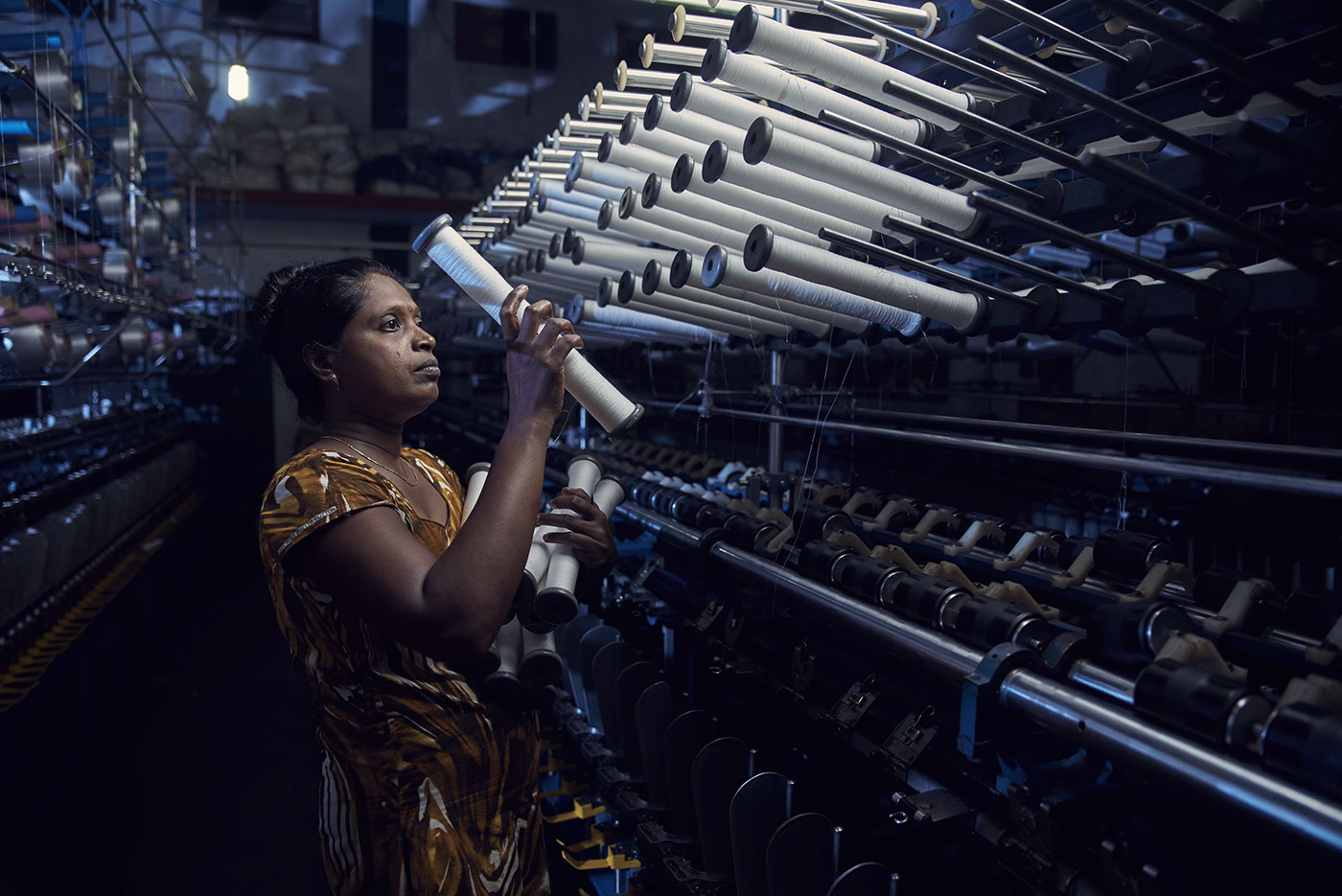

Safety Check -
Mr. Denison, one of DASH’s Senior Consultants inspects the surrounding area before removing an active mine from the ground. Thousands of mines still obstruct the safe return of the residents of Muhamalai, but Mr. Denison is quite optimistic. “After all the mines are cleared and the land has been handed back, I won’t have a job! I will be a victim of my own success!” he says in a lighthearted tone as he picks up his tools to remove yet another anti-personnel mine.
© Reza Akram / DFAT 2017

New Hope -
“I lost my leg to a mortar shell while fleeing this very place. It’s been 9 years since we left, but we finally got our land back last week, and I’m happy that we can be back again. I am going to cultivate this land. In fact, I started five days ago and I’ve already cleared out all the shrubs.”
© Reza Akram / DFAT 2017
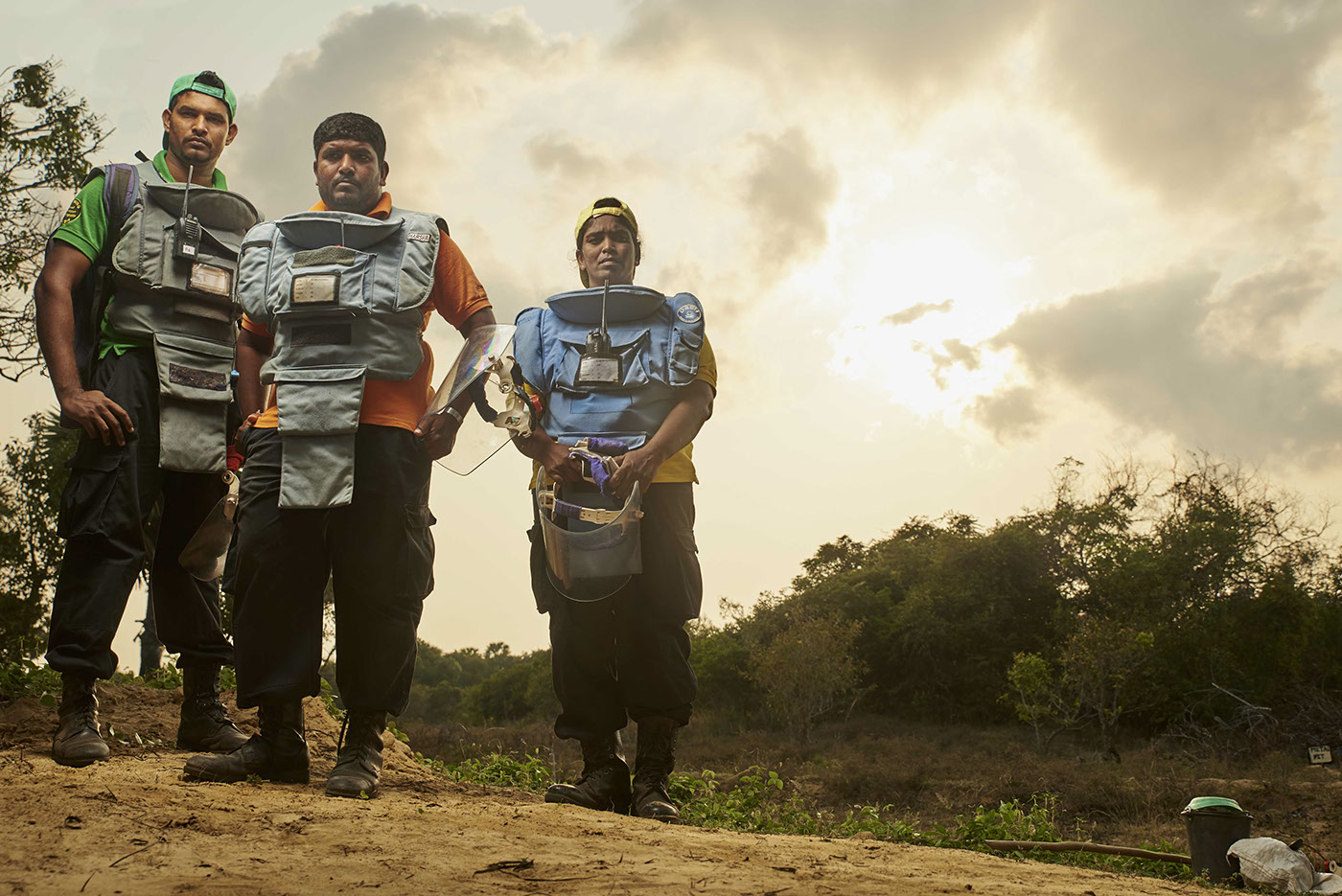
Not a job for the fainthearted -
It takes a special kind of resolve to be a de-miner. Hours, months, and years of painstaking work in the merciless heat of the northern peninsula has transformed these men and women into true unsung heroes of post-war Sri Lanka. More than 120,000 mines have been excavated in the wartime forward defense line in Muhamalai, and thousands of families have been resettled, all due to the tireless dedication of de-miners, such as those from DASH (Delvon Assistance for Social Harmony), pictured here. © Reza Akram / DFAT 2017

DASH -
Delvon Assistance for Social Harmony (DASH) is a Sri Lankan de-mining organization that has been tasked with the responsibility of clearing the mine infested lands of the North. The organization has single handedly cleared more than 9 million meters of land that was once mined and returned it to its rightful owners. Their 400 strong workforce of de-miners have been deployed in the Kilinochchi, Mullativu, and Vavuniya districts, and their efforts have been largely supported by funds from Australian Aid. © Reza Akram / DFAT 2017

Starting Over -
This young couple spent more than five years in a temporary displacement shelter in Vavuniya before they were resettled in their land with a new house constructed with the support of Australian Aid and UN Habitat. “After we got the house, we expanded it by making a verandah. We also put up new grills on the windows and tiled the floor. There’s more we want to do with the house, and we’ll do it slowly as we make more money. We try not to think too much about everything that happened with the past. Why think about it when there are so many better things to do for the future?”
© Reza Akram / DFAT 2017
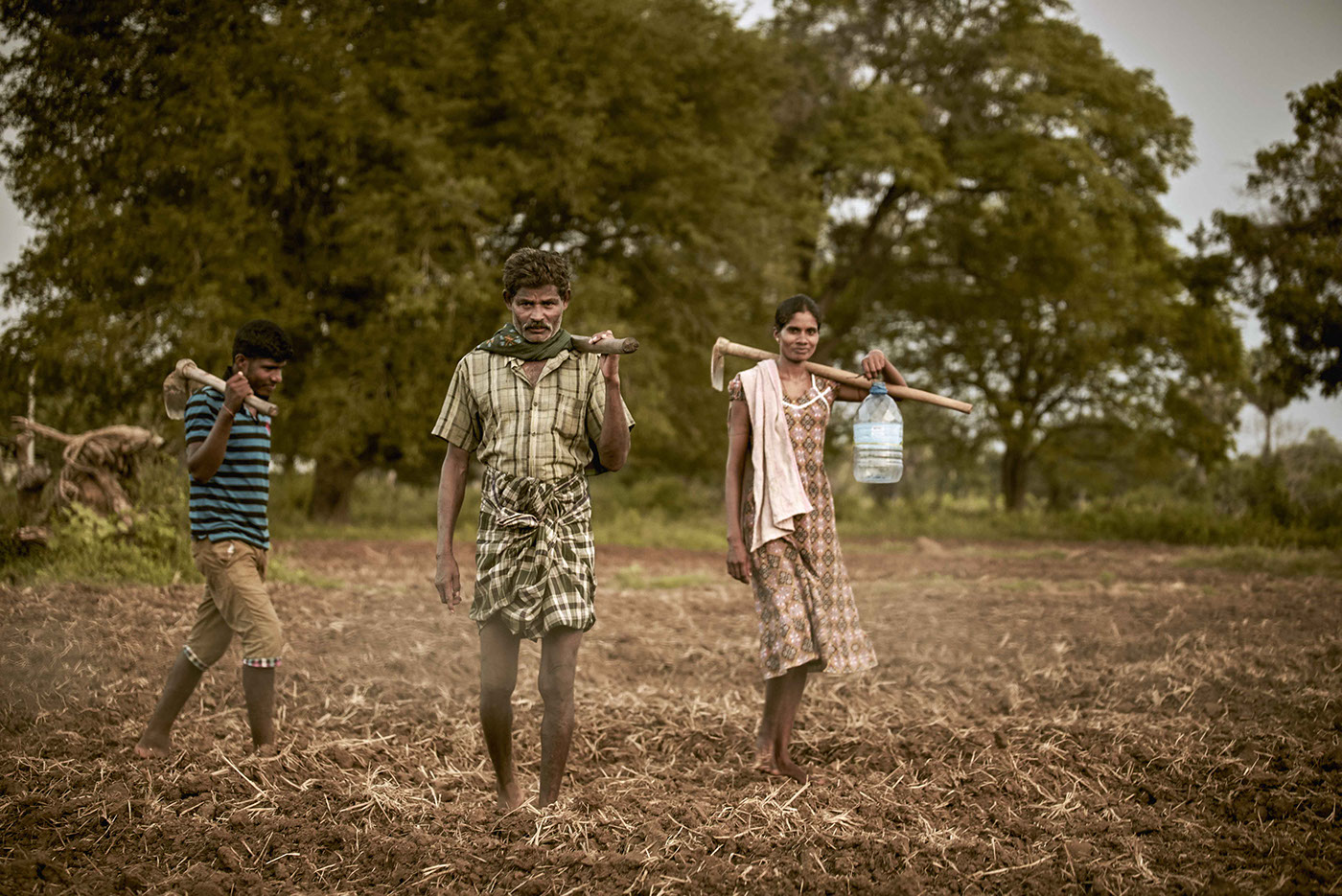
The Foundation of Fertility -
This family officially received their land from DASH a week before this picture was taken. The whole family will be working on tilling the soil for a variety of pulses and other crops that will populate this parched land and restore the fertility it used to thrive on decades ago.
© Reza Akram / DFAT 2017
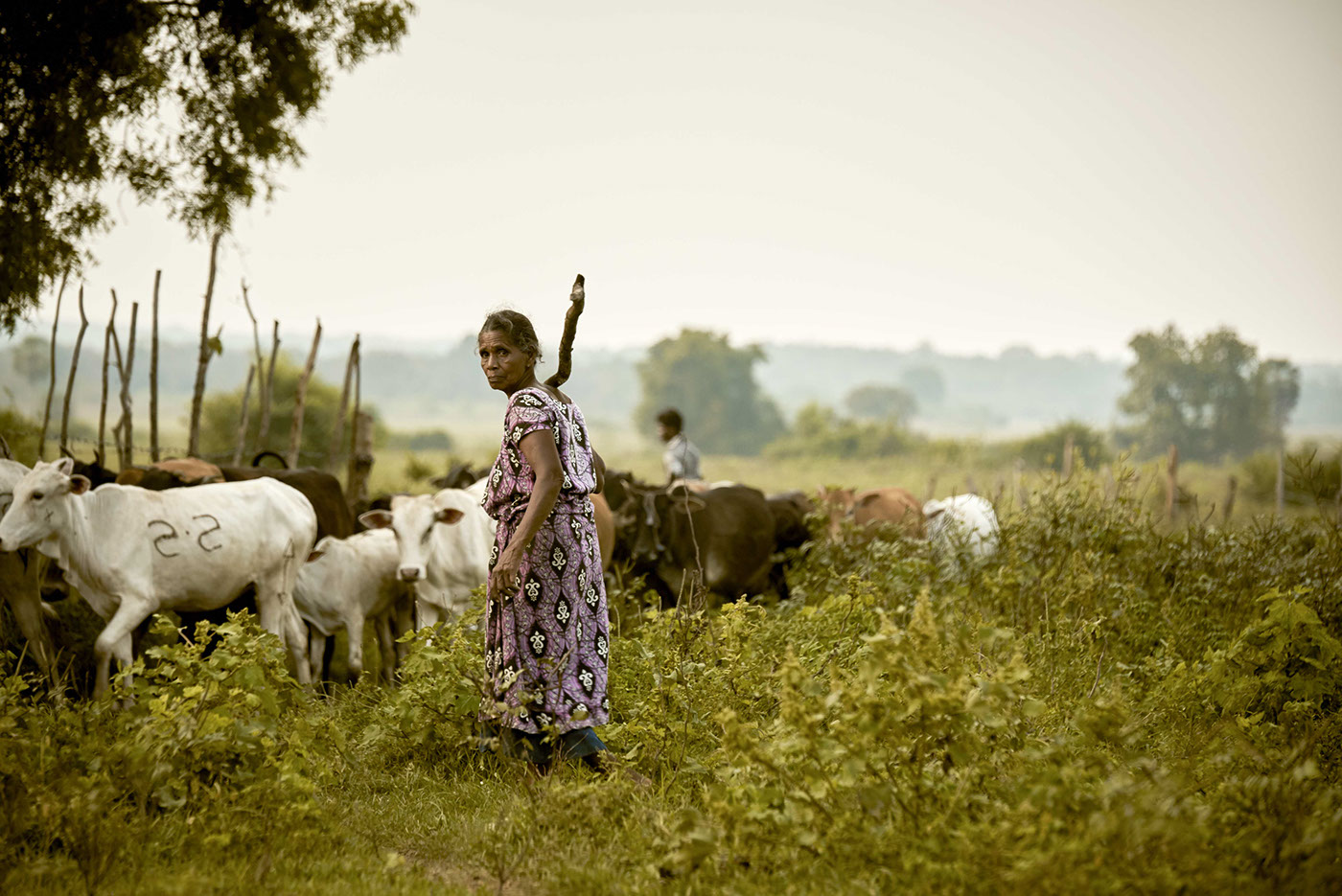
Equality -
Having lost her husband and children in the war, this elderly lady has adopted two children and supports them with the income she receives through her cows. She has seen much, survived many of her neighbors, friends, and family, and her reflectiveness runs deep. “All my cows are named after me. It’s my way of showing equality to all of them and reminding myself about how I am no different to them in the grander scale of things.”
© Reza Akram / DFAT 2017


Boiled and Dried -
Mr. Sivagumaran, a farmer by trade, hangs out freshly peeled and boiled roots of the palmyrah sapling, known as kotta kilangu, out to dry. The fibrous and woody tasting root is one of the biggest exports out of the island and sustains several hundreds of families living in Delft.
© Reza Akram / DFAT 2017

Harvest -
Freshly extracted pile of kotta kilangu is sorted before being hung out to dry in this household in Delft East. © Reza Akram / DFAT 2017

One Man’s Trash, Another Man’s Treasure -
Hemali and her husband Nimalsiri started collecting and separating solid waste by chance. “When Arthavida Limited started buying solid waste from people, we also sold them some unused stuff we had. But then, children from the area heard about this and started bringing me all types of solid waste to earn some pocket money. I bought it from them, and sold it to Arthavida Intermediary Limited for a slightly higher price. This kept going on, until everyone in the area started bringing in everything from bottles to old TV’s, and now we’ve been doing it since. It’s been 15 years since we started and we are very happy because we have a steady income that helps us live a comfortable life.” © Reza Akram / DFAT 2017

Elbow Grease -
Making cinnamon oil is a labor intensive task, and in mills like this one in the interior of Hikkaduwa, the hard work is done by workers such as 71 year old Gunasiri, who has been working for decades in this cottage industry. Every day, he would pile in a few hundred kilos of cinnamon leaves and branches into hefty wooden vats that are steamed at boiling temperatures to produce the potent liquid. This mill was established with the assistance of micro loans obtained through Arthavida Intermediary Limited, a micro-finance organization established with the support of Australian Aid. © Reza Akram / DFAT 2017

Undoing -
A group of fishermen undo their nets after making it back to the shore of Rathgama beach after a morning of fishing. Years ago, beach pollution was a pressing issue that affected beaches such as Rathgama, but with the solid waste management campaigns initiated by Arthavida Intermediary Limited in 2000 with the support of Australian Aid, communities were mobilized to clean and protect these idyllic beaches. 17 years onwards, everyone from fishermen to surfers can enjoy the views and waters of a pristine, unpolluted stretch of beach. © Reza Akram / DFAT 2017

Biggest Claws in Town -
“We started with a loan of Rs.5,000 from Arthavida Intermediary Limited”, says Nanda, a female entrepreneur who began her crab exporting venture together with her husband in 2004. “Now we get the crabs from different parts of the island, and we put them through a process of feeding in the lagoon behind our house. This makes them much bigger than the regular crabs in the market and in fact, these all go to foreign buyers!” Nanda has expanded the business over the years, and her loan facility with Arthavida too has expanded. Her latest borrowing of Rs.125,000 has been possible because of her consistent business performance, and she intends to use the loan to expand their operation further. © Reza Akram / DFAT 2017
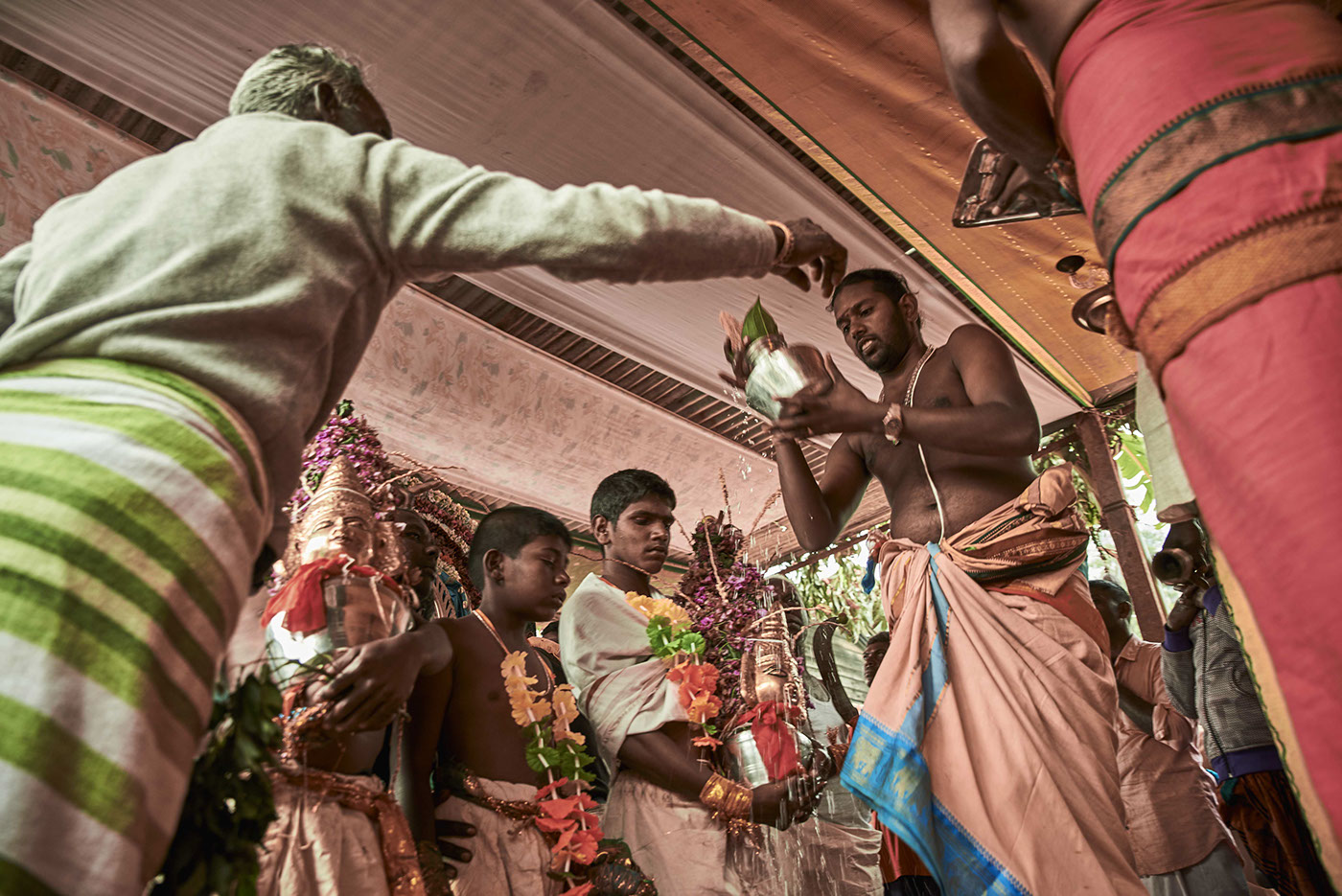
Blessing -
A plantation community in Lindula, Hatton, celebrate the “Thiruvilar” festival, a Hindu devotional ceremony dedicated to the goddess Parvati. “We make observances for the whole month and we celebrate the festival for five days. Before, we couldn’t celebrate before because we didn’t have water in the village. But since we received the water supply five years ago, we’ve celebrated every year” says K. Sasanthan, a village elder. Australia Aid installed a water purification plant and supplied the village with clean water from the springs of nearby Horton Plains, providing water for 150 families in the mountain hamlet. “It’s a blessing for us. It has changed everything.” © Reza Akram / DFAT 2017

Abundance -
Five years before the Australian Aid program’s water supply and sanitation project, this site used to have a solitary faucet that used to supply a village of 70 families. No more are the risks of water-borne diseases, frequent arguments with the neighbors, and hours spent in a daily struggle to collect water to survive. These children will never know the troubles their parents endured to obtain water thanks to the new faucets that each family has received through the program. For these children and their families, the strife of the bygone days is literally, a thing of the past. © Reza Akram / DFAT 2017

Time to Care -
“Before we got the taps, I had to walk up the mountain everyday for more than one and a half hours to collect water from the main tap in the village. I spend a lot of time just collecting water, and it tired me so much. I had to go to work, and clean the house, and I even had not time or energy to spend with the children. But now, there’s a tap right outside my house and I have so much more time to be with my children, and even watch some TV!”
© Reza Akram / DFAT 2017

Elixir -
Lack of access to water is a critical issue facing many plantation communities in the Hatton-Thalawakele region. Australian Aid, together with World Vision Lanka, implemented REWASH, a water purification and supply program in 2012, delivering clean drinking water to the households of more than 1,000 communities in the Nuwaraeliya district. By providing this basic need to communities in the region, the REWASH initiative has changed the lives of thousands of people whose thirst has now been bestowed with an abundance of this elixir of life. © Reza Akram / DFAT 2017

Past and Present -
Right beside the new house this family built with the support of Australian Aid and UN Habitat, stands the remnants of their old house; a vestige of what used to be before being assaulted by bullets and artillery during the final stages of the civil war. A juxtaposition of past and present, old and new, destruction and resurrection, the standing remains and the new house symbolize the inexhaustible tenacity of ordinary people and their extraordinary optimism for a brighter tomorrow. © Reza Akram / DFAT 2017
